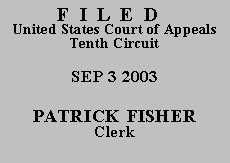

| CECIL J. TAGGART, JR., |
|
In November 2001, at the time of the complaint, Mr. Taggart was an inmate in DOC's custody. His complaint alleged that Defendants were deliberately indifferent to his medical needs as a recovering cancer survivor and violated his due process, Eighth Amendment, and state law rights by exposing him to unreasonably high levels of environmental tobacco smoke ("ETS") at three Oklahoma prisons. Specifically, he alleged that prison officials sell and distribute tobacco products at prisons to gain revenue, fail to enforce rules and restrictions on smoking, fail to prevent exposure to ETS due to improper ventilation, and house non-smoking prisoners with smoking prisoners. He sought both injunctive relief and damages.
In March 2002, Defendants filed a combined motion to dismiss and motion for summary judgment. Mr. Taggart was discharged from DOC custody in August 2002. In November 2002, upon referral from the district court, the magistrate judge concluded that each of Mr. Taggart's claims were either moot in light of his discharge, barred by the Eleventh Amendment, or unexhausted. The magistrate judge therefore recommended that Defendants' motion be granted. The district court adopted the magistrate judge's Report and Recommendation in its entirety over Mr. Taggart's objections and granted Defendants' motion to dismiss.
We review de novo the district court's grant of a Fed. R. Civ. P. 12(b)(6) motion to dismiss, applying the same standard as the district court. Sutton v. Utah State Sch. for the Deaf & Blind, 173 F.3d 1226, 1236 (10th Cir. 1999). We accept as true "all well-pleaded factual allegations" and those allegations are "viewed in the light most favorable to the nonmoving party." Id. Such a motion "should not be granted unless it appears beyond doubt that the plaintiff can prove no set of facts in support of his claim which would entitle him to relief." Id. (quotation omitted).
On appeal, Mr. Taggart reasserts that his claims are not moot, that the Defendants are not entitled to Eleventh Amendment immunity, and that he exhausted his claims. Aplt. Br. at 2-3, 16. After conducting a careful review of the issues and examining the parties' submissions, including Mr. Taggart's brief and reply, the record on appeal, and the relevant law, we are convinced that the district court's disposition was correct. For substantially the reasons cited by the magistrate judge and relied on by the district court, we conclude that Mr. Taggart's complaint was properly dismissed.
First, we agree with the district court that, on the basis of Green v. Branson, 108 F.3d 1296, 1300 (10th Cir. 1997), Mr. Taggart's claims for injunctive relief are moot given his release from confinement. After a de novo review, Higganbotham v. Okla., 328 F.3d 638, 644 (10th Cir. 2003), we also agree that the Eleventh Amendment bars Mr. Taggart's claims against the State of Oklahoma, the DOC, DOC Medical Services, and Warden Hines (acting in his official capacity). See Eastwood v. Dept. of Corrs., 846 F.2d 627, 632 (10th Cir. 1988). Even if any of Mr. Taggart's claims were read to be asserted against individuals acting in their individual capacities, we agree with the magistrate judge that Mr. Taggart would not have properly exhausted those claims as required by 42 U.S.C. § 1997e(a). Given this combination of problems with each of his claims, we conclude that the district court's resolution was correct. Finally, because the district court correctly dismissed Mr. Taggart's federal law claims, we perceive no abuse of discretion in its decision to refuse to exercise supplemental jurisdiction over his state law claims. See 28 U.S.C. § 1367(c)(3); Gold v. Local 7 United Food & Commer. Workers Union, 159 F.3d 1307, 1310 (10th Cir. 1998).
Accordingly, we AFFIRM the district court's dismissal of Mr. Taggart's complaint. Furthermore, we GRANT Mr. Taggart's motion to proceed in forma pauperis and remind him that he is obligated to make partial payments of the filing fee until the entire fee has been paid. We DENY his request for appointment of counsel and GRANT his request to have his supplemental authority considered (it does not change the outcome). Finally, counsel for Defendants is directed to observe the requirements of 10th Cir. R. 28.2 for future filings.
Entered for the Court
Paul J. Kelly, Jr.
Circuit Judge
*. This order and judgment is not binding precedent, except under the doctrines of law of the case, res judicata, and collateral estoppel. This court generally disfavors the citation of orders and judgments; nevertheless, an order and judgment may be cited under the terms and conditions of 10th Cir. R. 36.3.
2. After examining the briefs and the appellate record, this three-judge panel has determined unanimously that oral argument would not be of material assistance in the determination of this appeal. See Fed. R. App. P. 34(a); 10th Cir. R. 34.1(G). The case is therefore ordered submitted without oral argument.